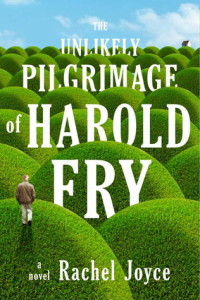
I enjoyed Miss Benson’s Beetle so much that I went back to look at this, Joyce’s first novel. The recently retired Harold has too much time on his hands. His wife Maureen keeps their home in a small village in southern England immaculate, seemingly angry at Harold though it is not clear why. For Harold “Days went by and nothing changed; only his waist thickened, and he lost more hair.”
Then a letter arrives, addressed to him in a shaky scrawl. It is from a former colleague Queenie Hennessy. They had been assigned to work together and had become friends, although they’d had no contact since she had moved away many years ago. She is now in hospice and writing to say goodbye.
Harold struggles to find the right words, but eventually writes a short note to her and sets off down the lane to post it. But he keeps walking, and walking, and eventually realises that he is going to deliver it by hand, walking the 500 miles north to Queenie’s hospice. After talking with a “girl in a garage” who teaches him how to microwave a burger and relates her story of keeping her aunt alive through faith, Harold sends Queenie a note telling her to wait for him.
Even the most analytical person can succumb to magical thinking. Harold comes to believe that he is walking to save Queenie. He is ridiculously unprepared, with no supplies or appropriate clothing, wearing yachting shoes which quickly wear out and give him terrible blisters.
What makes the story work is Joyce’s tone. She doesn’t make fun of Harold or look down on him. She presents each incident as it comes, leaving the reader to decide how we feel about Harold, and about Maureen, who finds that she misses Harold once he has gone. I fretted about Harold’s unworldliness, spending down his retirement as he journeys, not knowing how to care for his feet properly. Yet it is his innocence that draws people to him, almost all displaying the kindness and generosity that coexist with the hatefulness we see in the media.
This isn’t a fairytale. Pain is a constant. Not just the physical pain of walking day after day, but the emotional pain of reliving past mistakes, which is where Harold’s mind goes as he walks: his bleak marriage, the promising son who no longer visits, the self-loathing reinforced not only by their rebuffs but also the early rejection by his parents. And both he and Maureen have some kind of unfinished business with Queenie.
The aspect of novel-writing that I struggle with most is deciding when to reveal information. An author wants to create suspense by withholding information but revealing enough as they go along to reward the reader, as well as dropping clues along the way. Even in non-mysteries, most readers want to puzzle out what’s going on before being told.
Here, I felt the pacing of reveals was off. I don’t want to go into detail for fear of giving away too much. I just felt that the backstage machinery was too obvious in places. It’s good to have this model to set against other books where I found the pacing of reveals to be more organic and more satisfying.
I appreciated the changes Harold goes through during his walk, from his introspective moments to his painful losses of direction. I especially liked his experiences of England’s countryside, villages and towns on foot. I often walk in England for a week or ten days at a time, and have found it a vastly different experience than with any other form of transportation.
There were parts of the book I didn’t find as interesting and was tempted to skip, but I’m glad I took it slowly and persisted to the end. I’m also intrigued by the idea of a modern-day pilgrimage. Quite a few of my friends have been walking the Camino de Santiago. I’m more interested in smaller pilgrimages, at least for now.
If you were to go on a pilgrimage, where would you go and why?